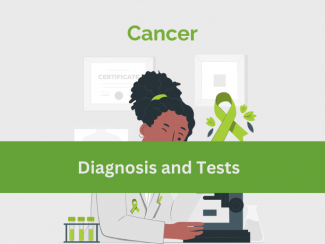Cancer is a group of diseases characterised by out-of-control cell growth. There are more than 100 different types of cancer. The cancer is named after the area of the body or organ where it originates.

Early detection can improve the effectiveness and success of the treatment. Depending on the type of cancer, the doctor may recommend some of the following:
- Imaging techniques such as X-rays, CT scans, MRI scans, and ultrasound to locate the tumour and the organ affected by it.
- PET scan (Positron Emission Tomography): Involves the injection of a radioactive tracer to highlight areas of cancer cells.
- Blood samples are analyzed for signs of cancer, which may include cancer cells, protein, or other substances released by cancer cells. Examples of blood tests include:
- Complete blood count: This common blood test is used to measure hemoglobin, red blood cells, white blood cells, and platelet count. An abnormal cell count may indicate blood cancer.
- Tumor Markers: Some tumors release substances called tumor markers, which can be detected in the blood. Examples of tumor markers include prostate-specific antigen (PSA) for prostate cancer, cancer antigen 125 (CA 125) for ovarian cancer, alpha-fetoprotein (AFP) for liver cancer, and human chorionic gonadotropin (HCG) for germ cell tumors, such as testicular cancer and ovarian cancer.
- Blood protein test: This test can detect certain abnormal immune system proteins that are elevated in people with multiple myeloma.
- Endoscopy to look for abnormalities inside the body. It involves inserting a flexible tube with a camera and light into the body to examine internal organs such as the digestive tract, respiratory tract, and other areas.
- Colonoscopy is done to detect colorectal cancer or any abnormal growth inside the colon and rectum.
- Biopsy: Extracting cancer cells and seeing them under a microscope is the only absolute way to diagnose cancer. It helps in determining if a tumor is malignant or benign in nature.
- Needle biopsy: Uses a thin needle to extract tissue.
- Surgical biopsy: Removes a larger tissue sample during surgery.
- Endoscopic biopsy: Uses a flexible tube with a camera to take tissue samples.
- Skin biopsy is done to detect skin cancers by examining suspicious moles and skin lesions.
- Mammography is the X-ray examination of the breast tissue. Used for screening and early detection of breast cancer in women.
- PAP smear - Cells from the cervix are collected to check for abnormalities that may indicate cervical cancer or precancerous conditions.
Changed
26/Apr/2024
Community
Condition
















